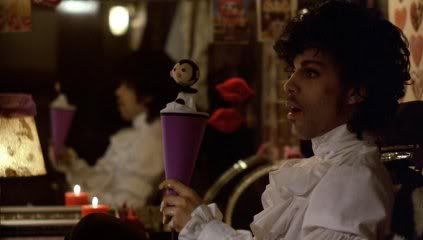
"They finally even made a movie about it... Whenever anything important happens in America, they have to gold-plate it, like baby shoes." - STEPHEN KING, Carrie
Is it still legal to discuss Prince on the internet? I'm pretty sure His Purpleness issued a fatwa some months ago, strictly forbidding the general public from even invoking his holy name on the web. But we believe in taking chances here at Unloosen, so we are ignoring the fatwa and presenting you with this brave, defiant review of Purple Rain.
"The movie" is an important milestone in the lifespan of any pop cultural phenomenon, particularly in America. When some comedian or singer or TV show or toy gets really popular with "the young people," you can be sure "the movie" will be coming soon. After all, the young people are the ones buying the movie tickets for the most part, so Hollywood wants to give them movies about whatever the hell they're interested in this year or this month or this week. Preferably as soon as possible... you know, before they forget. You know how screwy these kids are. One week it's this thing, the next it's something else. Now, the pop cultural phenomenon in question doesn't necessarily have to vaporize a few fortnights later, but it just might. Really, if we are being very hard-nosed about these things, we will see that A Hard Day's Night and Cool as Ice were made for the exact same reason: to capitalize on a teenage fad. Some music act is hot, so let's get them in front of the cameras. Couple this with the fact that pretty much every singer dreams of being a movie star, and you know what you get? Lots of movies starring pop singers. In a weird way, these movies add a sort of permanence to what might otherwise have turned out to be ephemeral. That's why I started this article with that Stephen King quote. These movies really are like gold-plated baby shoes. Pop stars might fall off the charts and into obscurity in a few months, and they inevitably will age and evolve over time. But those movies never change. They're in the can forever, preserving the stars in amber as they were during their zeitgeist-capturing heydays.
Of course, it always helps to diversify one's portfolio (so to speak) in the notoriously fickle business we call show. If a singer shows promise as an actor, he or she might have a whole second career going. Who'd have guessed country crooner Reba McEntire would be the star of a long-running sitcom, for instance? Out of some combination of vanity and stubbornness (both prerequisites for stardom, I might add), Madonna, Bob Dylan, Mick Jagger, and David Bowie have all flogged away at acting careers, to varying degrees of success over the years. And then there is the case of Prince Rogers Nelson, the scarily talented and often-just-scary Minneapolis R&B/rock musical genius whose public persona seems to be a combination of James Brown, Little Richard, Jimi Hendrix, and Captain Hook from Peter Pan. Prince was hardly a newbie by the time he got the go-ahead to do "the movie" in 1984. He'd been a successful recording artist since 1978, when he was only 20, and had already released such popular albums as 1999 and Controversy by that point. But Purple Rain was Prince's Thriller moment. The film and (especially) its hit soundtrack album (#1 for 24 weeks!) catapulted him from mere mega-stardom to super-ultra-mega-deluxe stardom. I was a little too young for all of it at the time. I'd have been eight when the R-rated flick came out, i.e. not really in the target demographic. Like everyone else who lived in America during the Reagan years, I certainly heard Prince's songs at the time and for years afterward. You couldn't really avoid these tunes when they were blaring from car stereos in all directions. But Prince had a distinctly "adult" vibe to his image and career, much more so than Michael or Bruce or Cyndi. Even Madonna wasn't as frankly and threateningly sexual as Prince was at the time. Just saying his name out loud seemed a little dirty to me. I wasn't really into rock music back in '84. It would take a couple of years -- and the discovery of nerd-friendly bands like Devo, Talking Heads, and They Might Be Giants -- to indoctrinate me into the world of rock.
But a quarter century has passed, and it is now time for me to man up and face the Rain. It wasn't easy. To be honest, I was still a little afraid of it. The special edition DVD has, as you'd expect, a lurid purple cover. And there you'll find that iconic image of Prince in his Seinfeld-esque puffy shirt and purple top coat, straddling his obscenely purple motorcycle, as his leading lady Apollonia stands in a doorway at the top of some stairs in the background, looking like a vampire hooker. And there's fog everywhere! Citizens, I won't lie. It looks sleazy. I was more than a little embarrassed to be checking this thing out from the local library. I felt sure the old lady behind the counter was silently judging me.
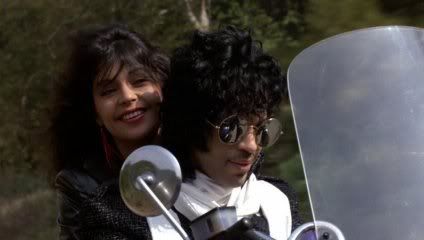
Despite these obstacles, I did manage to watch Purple Rain in preparation for this article. And you know what? The darned thing's not entirely bad, and if I squint I can almost see why it was an $80 million hit back when $80 million went further than it does now. As a delivery system for the Thing That Is Prince, Purple Rain more than gets the job done. You say want a tiny, androgynous man humping the stage in front of an appreciative Minneapolis audience? You got it, mister! He's on screen, I'd estimate, 80-90% of the time. And for most of that time, he's doing what he does best: singing and playing guitar on stage with his band, the Revolution (whose members portray themselves with varying levels of enthusiasm). At least three of the songs in this film -- the title track, "When Doves Cry," and "Let's Go Crazy" -- are among those inescapable, indelible Prince hits I mentioned earlier. They'll be with us forever. Someone's listening to those songs right now, I'll wager, playing air guitar and mouthing the words in front of a mirror. I don't know whether or not Prince would approve of that either. But, anyway, these songs are still astonishing and richly deserve their vaunted place in the pop culture pantheon.
Ironically, though, that's part of the reason that Purple Rain pretty much fails completely as a narrative. The film is supposed to tell the story of "The Kid," a very Prince-like aspiring musician on the Minneapolis club scene. Structurally, this means that Purple Rain closely resembles 8 Mile with Eminem. Both films supposedly give us the gritty, unglamorous stories (tastefully fictionalized, of course) behind the careers of controversial pop stars. We see their early professional ups and downs in their respective local music scenes, plus plenty of ugly, unpleasant family and relationship drama on the side, too. And through all their tribulations and setbacks, these young men are guided by singular desire: to succeed. They know that music is their ticket to a better life, and they're not going to give up on their dreams. Okay, that's great. But somehow this seems a better fit for Eminem than it does for Prince. For one thing, Eminem's turbulent personal history has always been a key component to his music and has been very widely reported in the media. On the other hand, Prince has been extremely media shy throughout his career, and his lyrics don't function terribly well as an autobiography. So, really, who even knows or cares what Prince's backstory is? Secondly, Eminem has never been shy about presenting himself in a negative light on his albums, and in 8 Mile we get to see his character, Rabbit, crash and burn as a rapper before finally succeeding. But Prince is too cool a customer for that. He is fully formed when he meet him, both in terms of his music and his fashion sense. He enters this movie on a motorcycle which matches his outfit, for God's sake! He seems more like a costumed superhero who fell to Earth from Planet Sexy than a mere mortal rock star. It's hard to take any of his problems too seriously. Prince is never anything other than Prince for even a second. Even when he's talking to policemen after his abusive father's suicide attempt (by gun) or when he's fantasizing his own suicide (by rope), he always seems like he's two seconds away from posing for an album cover. He's posing all the time. Throughout this movie, people occasionally tell "The Kid" that his music isn't going to catch on, but it's impossible to believe the naysayers because we know the truth. The soundtrack album was #1 for almost half a year, after all. These very songs were burned into America's brain. And we're supposed to believe this guy is struggling to make it? Come on! Who do you think you're fooling?
Can Prince act? Frankly, I don't know. I've seen a whole movie in which he's the unquestioned star, and I still have no idea whether the man can act or not. What I can honestly say is that he doesn't act in this movie. It seems like a personal choice. He refuses to act. One of Prince's very rare television interviews was a famously stilted appearance he made on American Bandstand in the early 1980s. If you don't have time in your life to watch Purple Rain in its entirety, watch that American Bandstand clip instead because it basically gives you the whole "Prince acting" experience in a nutshell. At one point, Clark asked Prince how many instruments he played, and the young musician wordlessly held up four fingers as an answer. In this very movie, the members of his backing band, The Revolution, confront him at one point about being such a paranoid control freak and he responds to their complaints via a puppet. I'm not kidding.... a puppet! Where'd he get that puppet anyway? I'm surprised he didn't use it in all his other scenes, like the tacked-on, perfunctory romantic subplot. Yeah, "The Kid" has a supposed "romance" with fellow up-and-comer Apollonia, but their conversations largely consist of Prince barking terse, two-or-three-word orders at her. "Get on!" "Give me that!" "Let's go!" That's Prince the Silver Screen Lover. I guess there's some kind of point being made here, because we're supposed to see that The Kid has learned all the wrong lessons about how to treat a lady from his slap-happy musician pappy, but I found these scenes neither convincing nor terribly interesting or compelling.
I realize I've spent the last few paragraphs complaining about Purple Rain, but the truth is that I more or less liked the darned thing. The concert sequences are -- and I'm not ashamed to use this adjective when it's warranted -- electrifying. I have thus far neglected to mention the movie's flamboyant villain, Morris Day, who I guess is playing some fictionalized version of himself in this film. A rival funk bandleader who would have both the Minneapolis club scene and the heart of the fair Appolonia for his very own, Morris is a shameless schemer straight out of Saturday morning cartoons. In fact, he and his sidekick Jerome Benton (also apparently playing himself) reminded me quite a bit of Dick Dastardly and Muttley from Wacky Races. They're among the few characters in this film who seem to notice that Purple Rain is utterly ludicrous and don't even pretend to take it seriously. In retrospect, that was really the wisest approach all along.
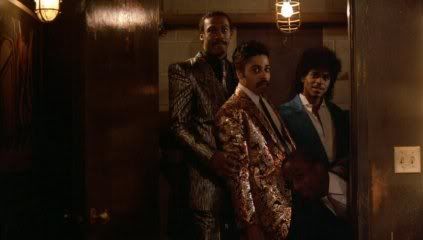
In this series, Joe and I have touched on 20 films that were big in the '80s, either in our personal lives or in the culture at large -- and frequently both. (This entry, our 19th, covers film #21.) Along the way I've managed to introduce Joe to some films that he otherwise might not have seen, but the same cannot be said for me until now. This is not to say that I had a burning need to fill the Purple Rain-sized whole in my film education, but I have long been curious about the abbreviated acting career of the Artist Who Used To Formerly Be Known As Prince But Now Is Known As Prince Again. After all, Purple Rain was a big enough hit that it begat Under the Cherry Moon (which rather improbably provided Kirstin Scott Thomas with her big-screen debut), Sign o' the Times (his one true concert film) and Graffiti Bridge. Tellingly, all three of those follow-ups were directed by Prince (who also wrote Sign and Graffiti for good measure), but only the last one was an actual sequel to the film that, a quarter century later, remains his one true box-office success.
Even if I didn't see Purple Rain when it first came out (I turned 11 in 1984, so R-rated movies were still strictly off-limits to me), I was able to get the gist of it thanks to MTV's airing of the video for "When Doves Cry" in heavy rotation that summer. (I would provide a link to said video -- which perfectly encapsulates the themes and much of the imagery of the film -- but as Joe said Prince's people have been on a tireless crusade of late when it comes to expunging his material from the Internet. Unless, of course, it's the man himself trolling YouTube and other sites for fans/flagrant copyright violators to report. Based on his control-freak reputation, I actually wouldn't put that past him.) Coupled with my enthusiasm for the videos for "1999" and "Little Red Corvette," I was quite the budding Prince fan but somehow never got around to picking up any of his albums. Perhaps I knew instinctively that if I did there was a chance my mother would ask to listen to one and be scandalized by the likes of "Darling Nikki" (one of the songs that got Tipper Gore's dander up back in the day). Choosing the path of Hall & Oates and Huey Lewis and the News seemed much safer in comparison.
Then again, even with as many hits as they had, nobody to my knowledge ever asked Daryl, John or Huey (or anyone in the News for that matter) to star in a semi-fictionalized musical biography charting their trials and tribulations on the way to fame and fortune. (To see how such a thing can go horribly, horribly wrong, check out Mariah Carey's Glitter some time... or don't. Only you know how much your own time is worth to you.) More than likely the mere existence of MTV -- which gave bands the chance to make any of a number of three-minute films, biographical or otherwise -- obviated the need for the film industry to craft as many vehicles around the nascent personalities of up-and-coming rock-and-rollers as it had during the '60s boom. (Did you know Herman's Hermits starred in three motion pictures? Three!) Of course, by the time he starred in Purple Rain, Prince was well past the up-and-coming stage of his career, which is why the inevitable comparison with A Hard Day's Night is both apt and misleading at the same time.
Much has been written about the way A Hard Day's Night helped to define John, Paul, George and Ringo as individuals in the eyes of their fans (much as many aspects of Prince's public persona were cemented by his turn in Purple Rain), but the most important thing about their feature film debut was that it was most emphatically about the present, where Beatlemania already existed, and not the path that led to it. That story would be told on film many times in the decades to come, but it wouldn't star the Beatles. And while it's true that Prince is playing a character called "The Kid," which is how co-writer/director Alfred Magnoli tries to get away with the fiction that he's an unknown, struggling artist, it's hard to believe scenes like the one where he slays the crowd with the title song and then angrily stalks off the stage, somehow thinking that he's bombed, only to return triumphant moments later to sing the two closing numbers, "I Would Die 4 U" (which, as producer Robert Cavallo says on the commentary, feels somewhat perfunctory coming after the cathartic "Purple Rain") and "Baby I'm a Star" (which, in all honesty, was never really in question).
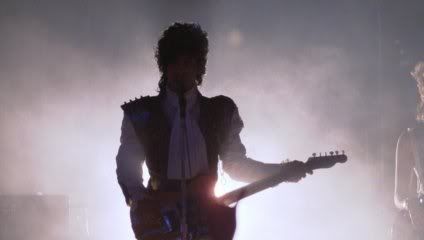
Since the live performances are the most electric scenes in the whole film, one wonders why Prince didn't simply go the concert film route -- à la Led Zeppelin's The Song Remains the Same, Frank Zappa's Baby Snakes or the Rolling Stones' Let's Spend the Night Together -- for his maiden cinematic voyage. Not only was his back catalog deep enough, but he could have easily filled out the evening with unreleased tracks from his vaults and still not broken a sweat. If he wanted to, he could have even kept The Time and Apollonia 6 as support acts, letting them come out and perform "Jungle Love" and "Sex Shooter" the way Talking Heads morph into Tom Tom Club for "Genius of Love" in the middle of Stop Making Sense. As it is, the film opens with The Revolution's blistering performance of "Let's Go Crazy," during which we're introduced to aspiring singer/dancer Apollonia skipping out on a taxi fare and taking a room at a sleazy hotel and Morris Day preening as he prepares for his grand entrance to the club. Then, after the briefest of pauses, The Time jumps straight into "Jungle Love," which unfortunately isn't allowed to play out completely because the film needs to follow Prince home on his motorcycle to look in on his abusive father and wayward mother. (It's almost surreal that his father's biggest complaint about his mother is that she doesn't clean often enough.)
What follows is a semi-coherent narrative made up of half-scenes and barely functional dialogue full of bald-faced exposition recited by musicians with little to no acting experience who are essentially playing thinly conceived variations on themselves. I'm not sure why Prince would want people to associate him with the character of The Kid, though, since he's kind of a dick. Take, for instance, the scene where he tricks Apollonia into removing all of her clothing and jumping into a freezing cold lake, then keeps scooting his motorcycle away from her whenever she tries to climb on. The Kid is also perpetually late for business meetings and band rehearsals and keeps putting off Wendy and Lisa, two members of his band with songwriting aspirations. (It's after Wendy calls him out on his paranoia, telling him, "You can really hurt people," that he performs his bizarre ventriloquist act.) Overall, though, he saves his worst behavior for Apollonia.
Apparently determined to top the incident at the lake, Magnoli and his co-writer William Blinn (a TV veteran who wrote Brian's Song and created the series Starsky and Hutch, among other things) draft a scenario where Apollonia -- who, remember, is an unknown who has to stay at a seedy dive because it's the only place she can afford -- pawns her anklet so she can buy The Kid a guitar (which he seems genuinely surprised to get, like it's Christmas morning or something). Then, when she casually announces that she's joining Morris Day's girl group, he belts her one (a real "I learned it by watching you" PSA moment) and then immediately switches gears, inexplicably asking her, "Don't I make you happy? Don't you like the way we are?" Yeah, Kid, I'm sure she's thrilled about getting slapped around by you simply because she wants to have a career of her own. He won't even leave her alone when he's onstage, causing her to burst into tears with the masturbation anthem "Darling Nikki" (which doesn't seem too far removed from her own group's "Sex Shooter" when you get right down to it). Odd, then, that that's the song that inspires the none-too-imposing club owner to tell The Kid, "Your music makes sense to no one but yourself."
The crux of the matter, psychologically speaking, is The Kid's contentious relationship with his father, a brilliant pianist/composer with anger management issues. I don't know how much of that correlates to Prince's actual family history, and frankly I don't want to know, but I doubt he ever confronted his own father by saying, "I saw Mom up the street. She looked pretty bad. Any idea how she got that way?" That's the sort of line that only rings true to a screenwriter with a tin ear for dialogue. Purple Rain is much better off when it lets Prince's music speak for him.
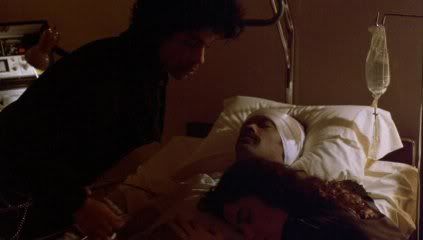
Up Next: Our series concludes with an unexpectedly quasi-sentimental dose of holiday cheer -- unless my library manages to Scrooge me out of it.

Leave a comment